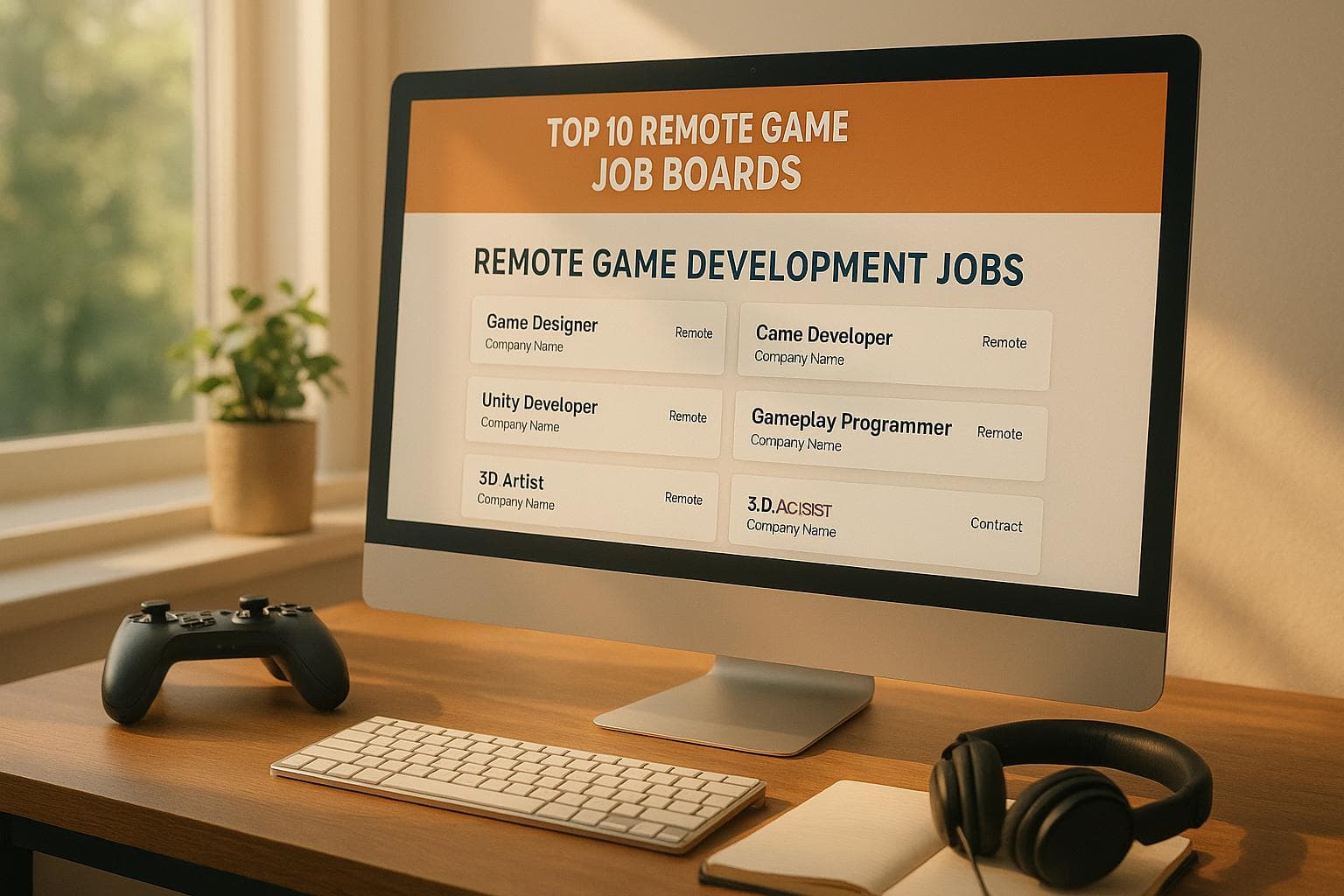Top 10 Remote Game Job Boards
Remote work is transforming game development. With 28% of employees globally working remotely and 22.8% in the U.S. (about 35.1 million people), game studios are embracing remote-first hiring. Asia leads in gaming job postings (32.5%), followed by Europe (28%) and North America (23%). Specialized job boards now connect developers with global opportunities.
Here are 10 top platforms to find remote gaming jobs:
- Remote Jobs For Software Engineers: Aggregates listings from 50+ boards with salary transparency and advanced filters.
- Remote Game Jobs: Gaming-specific roles with robust search tools for full-time and contract positions.
- Work With Indies: Focused on indie studios, offering creative and technical roles with clear salary details.
- GameJobs: Thousands of listings across all game development areas, emphasizing salary transparency.
- WellFound: Tech-focused platform with 15,500+ remote jobs, advanced filters, and salary clarity.
- We Work Remotely: Diverse gaming roles with filters for categories, regions, and experience levels.
- Remote OK: Niche gaming pages with filters for salary, benefits, and location preferences.
- Remotive: Gaming-specific sections with categorized job types and salary info.
- LinkedIn: Combines job search with networking, offering remote gaming roles and recruiter connections.
- Indeed: Broad job database with salary transparency and flexible search filters.
Quick Comparison
| Platform | Game Focus | Job Types | Advanced Filters | Salary Display | Employer Pricing |
|---|---|---|---|---|---|
| Remote Jobs For Software Engineers | Partial | Full-time, Contract, Freelance | Yes | Yes | $19–49/month |
| Remote Game Jobs | Yes | Full-time, Contract | Yes | No | $29 per listing |
| Work With Indies | Yes | Full-time, Part-time, Contract | Yes | No | $49–199 per listing |
| GameJobs | Yes | Full-time, Freelance | Yes | No | $299–405 per listing |
| WellFound | No | Full-time, Contract | Yes | Yes | Varies |
| We Work Remotely | No | Full-time, Part-time, Contract | Basic | No | Varies |
| Remote OK | No | Full-time, Freelance | Yes | Yes | Varies |
| Remotive | No | Full-time, Freelance | Yes | No | Varies |
| No | Full-time, Freelance | Yes | Yes | Varies | |
| Indeed | No | Full-time, Freelance | Yes | Yes | Varies |
Use these platforms to find your next remote gaming role. Tailor your resume, highlight your skills, and build connections to stand out in this growing market.
How To Get A Well Paid Remote Job in Game Dev.
1. Remote Jobs For Software Engineers
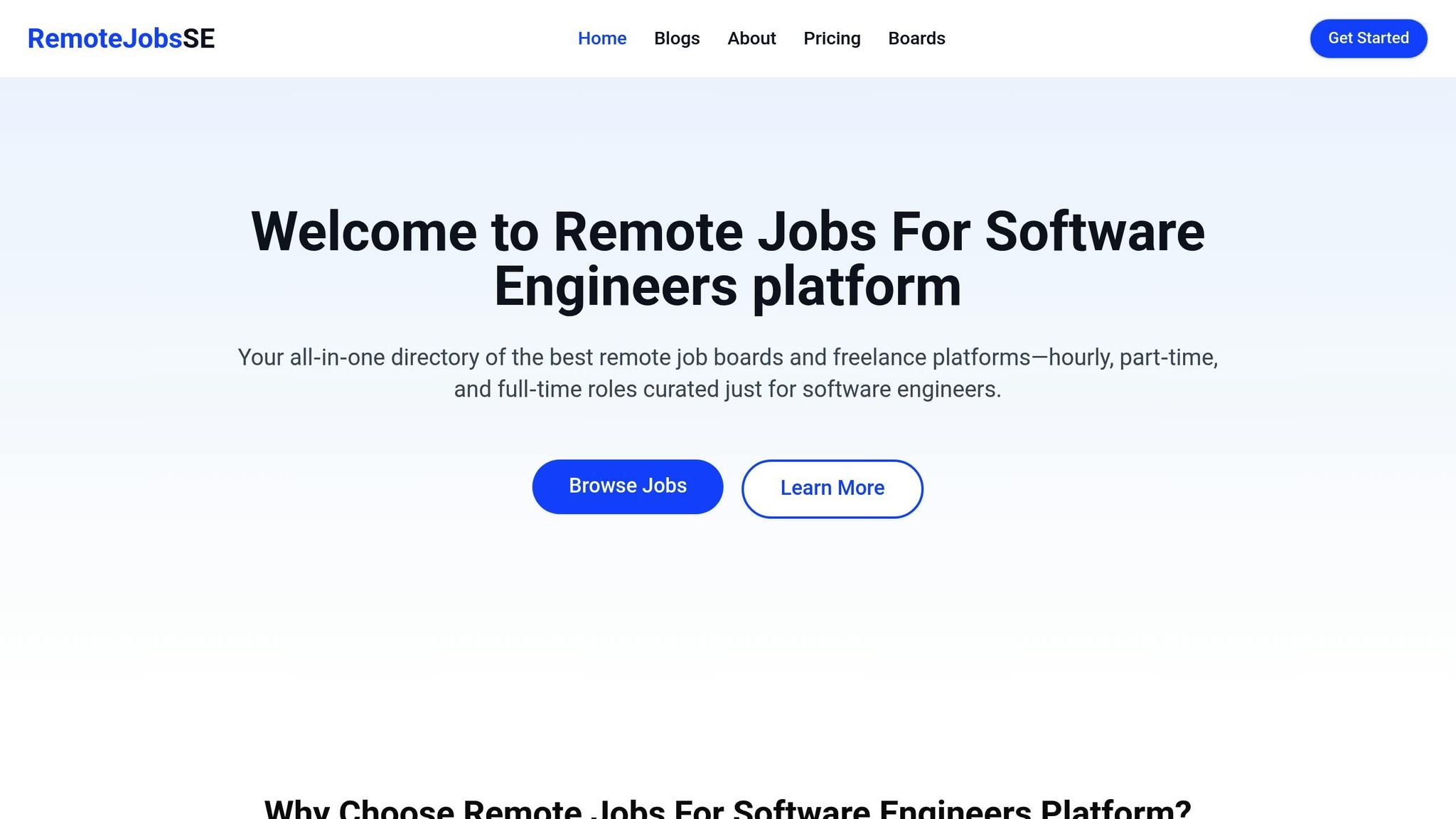
Artur Abdullin's Remote Jobs For Software Engineers is a platform designed to connect tech professionals, especially game developers, with remote opportunities. It pulls listings from over 50 curated job boards and freelance platforms, offering a centralized hub for discovering roles in the tech and gaming industries.
Focus on Gaming and Tech Roles
This platform caters to both software engineers and gaming specialists. It aggregates job postings from niche gaming boards and popular tech sites. Whether you're looking to work with indie studios or major players like Discord, Meta, Netflix, or Oculus, there's something here for everyone.
Job Types: Full-time, Contract, and Freelance
The platform offers a mix of job types, including full-time, part-time, and contract roles. Examples include:
- Discord: Senior Software Engineer, Game Integrations, with an annual salary of $196,000–$221,000 [4].
- Agama Solutions: Senior Game Developer (W2 contract), paying $80–$85 per hour [6].
- Freelance work: Opportunities via platforms like Toptal and Upwork.
This variety ensures flexibility for professionals with different career goals and availability.
Advanced Search Filters
The platform's search tools make finding the right job easier. Filters allow users to refine searches by salary, experience level, company type, and job category. While the free version includes basic search options, the Pro plan ($19/month) provides advanced filters and job alerts. This is especially helpful for those focusing on specialized roles, such as Unity developers, gameplay engineers, or technical designers.
Transparent Salaries in USD
One standout feature is salary transparency. Job postings include clear salary ranges in USD, making it easier for candidates to evaluate opportunities. For instance:
- Netflix: Game Producer ($180,000–$250,000 annually)
- Meta: Technical Game Designer ($135,000–$194,000 annually)
- Oculus: Senior Game Producer ($154,000–$217,000 annually) [6].
According to ZipRecruiter, U.S.-based remote game developers earn an average of $108,471 annually, with salaries typically ranging from $81,500 to $124,000. Top earners can make up to $179,500 [5].
This level of transparency and detail makes the platform a valuable resource for remote tech professionals.
2. Remote Game Jobs
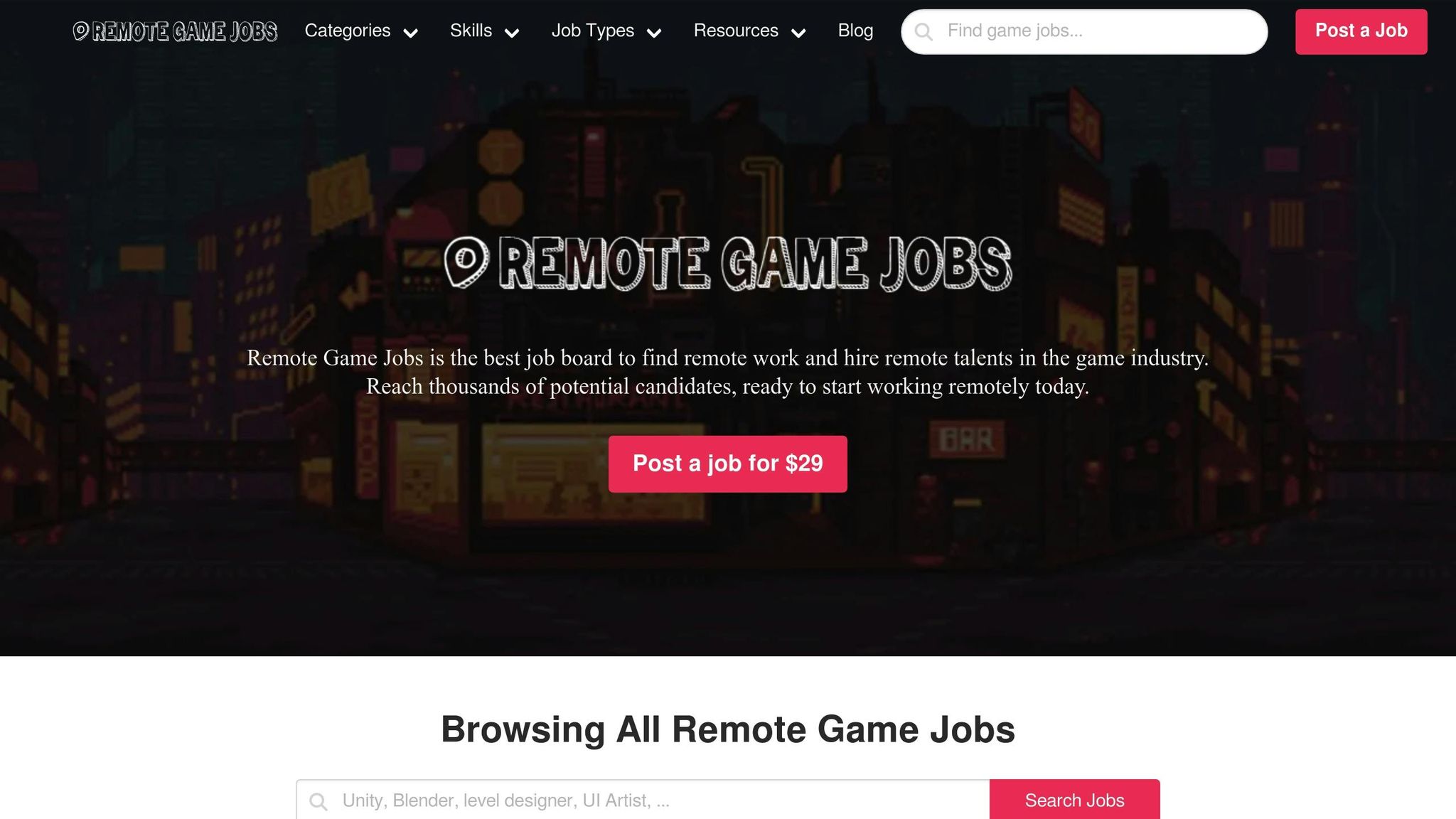
Remote Game Jobs is a dedicated job board tailored specifically for the gaming industry [7]. By focusing solely on gaming-related opportunities, it eliminates the hassle of sorting through irrelevant postings, making it easier for gaming professionals to find roles that match their expertise.
Types of Job Listings
The site offers a mix of full-time and contract positions, catering to professionals seeking either long-term stability or project-based work. It's designed to support individuals at various stages of their careers.
Search and Filtering Options
With its robust search features, Remote Game Jobs allows users to filter roles by category, required skills, and employment type. This targeted system helps game developers zero in on opportunities that align with their specific talents and career goals.
For employers, posting a job costs $29 [7], providing an affordable way for studios - big or small - to connect with skilled remote talent in the gaming world. This streamlined approach makes Remote Game Jobs a popular choice among gaming professionals and studios alike.
3. Work With Indies
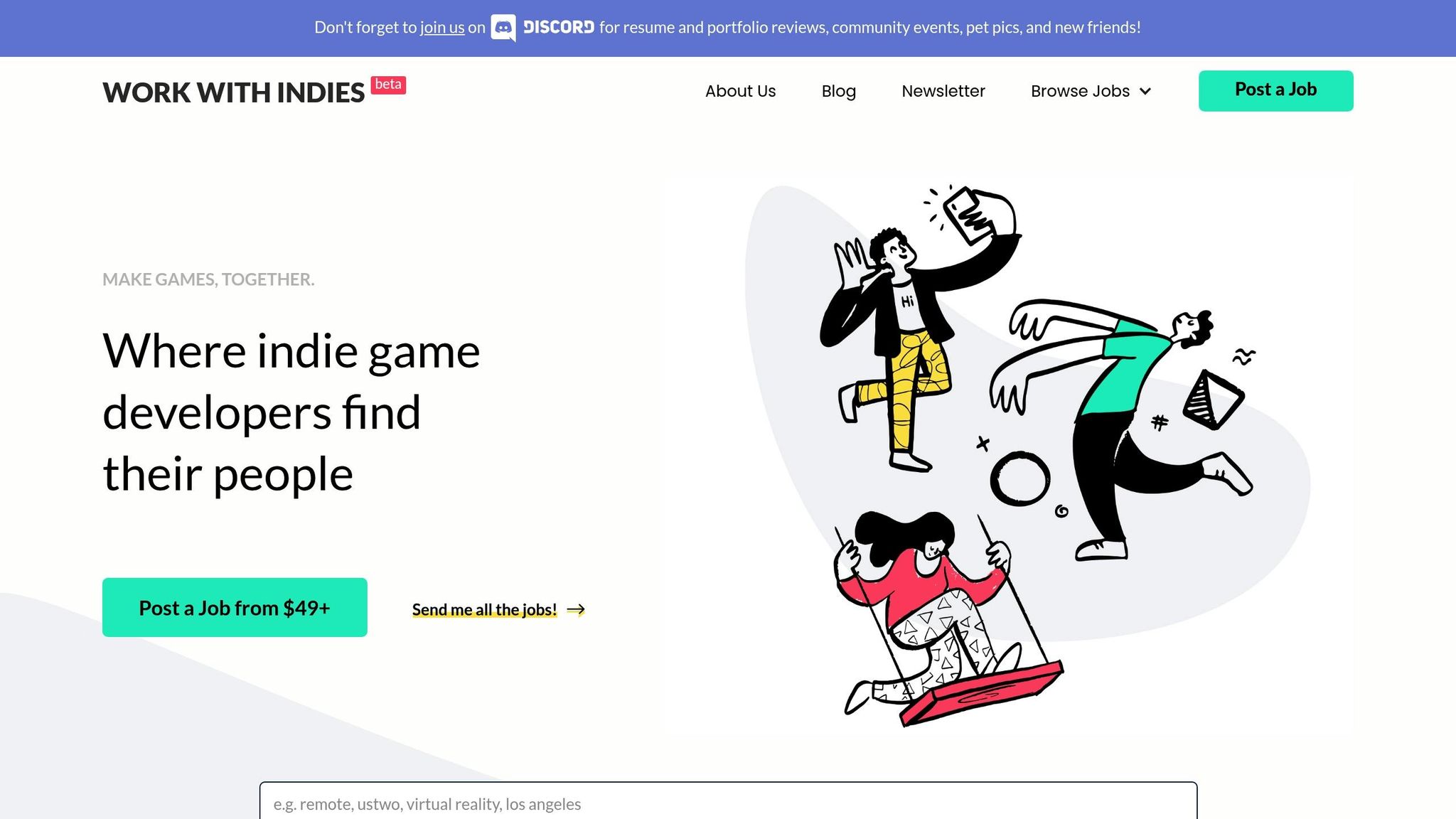
Work With Indies is a platform designed to connect job seekers with indie game development studios. Since its launch in 2020[9], it has focused on offering exciting opportunities for those passionate about indie games. Whether you're looking for technical or creative roles, the platform curates listings that reflect the unique spirit of the indie gaming community[8].
Focused on Gaming and Tech Roles
Work With Indies is all about indie game development[8]. Its tagline highlights the creativity and dedication of the people behind these games. Every job listing is tied to game development, ranging from technical positions like Unity developers to creative roles such as 3D art directors and level designers. This targeted approach ensures that job seekers find opportunities tailored to their skills and interests.
Variety of Job Opportunities
The platform features a wide range of job types, including full-time, part-time, and contract positions. Recent postings showcase the breadth of opportunities available:
- Optillusion Games: Looking for a hybrid Technical Artist in Orange County, CA.
- Forklift Interactive: Offering remote full-time roles for a Lead Game Designer and a Senior Unity Developer (CET ± 3 hours).
- prealpha: Seeking a part-time remote Game Content Curator.
- Triangle Wave Game Development: Posted a full-time remote 3D Art Director role based in the UK.
- Two Muffins: Hiring a contract 2D Artist/Generalist for on-site work in Sydney, Australia.
- Sindria World: Advertising a part-time Junior or Mid-Level Animator position.
Transparent Salary Information
Work With Indies stands out by providing clear salary details in U.S. dollars, helping job seekers make well-informed decisions. For instance, in March 2025, Colonist - a digital board game platform - posted a Game Experience Designer role with a salary range of $2,000–$5,000 USD per month[10]. This transparency reflects the platform's dedication to offering candidates clarity and fairness when exploring opportunities.
4. GameJobs
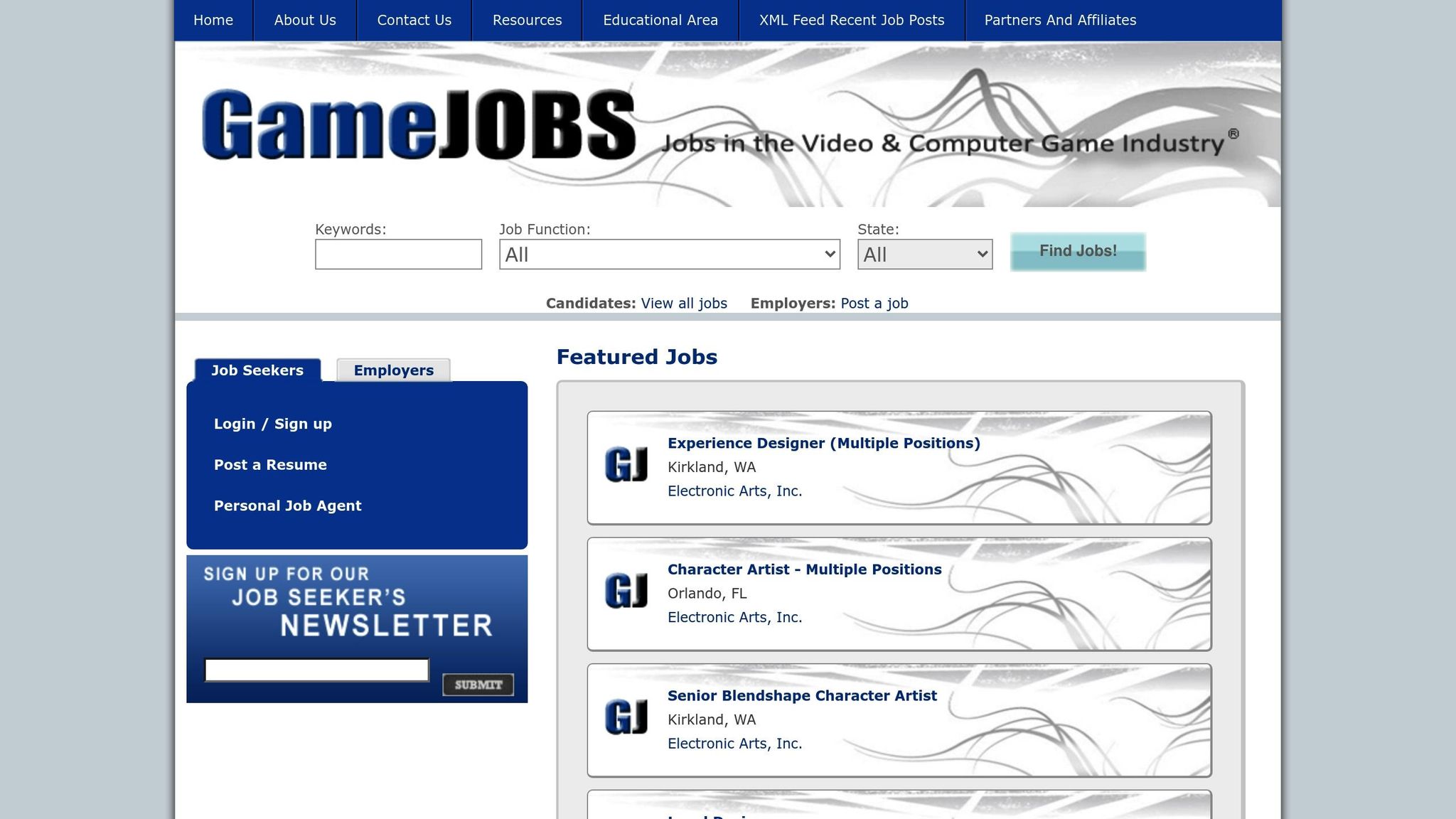
GameJobs serves as a dedicated platform that bridges the gap between game development professionals and a wide array of career opportunities. By offering specialized tools and resources, it has carved out a strong foothold in the gaming job market, making it easier for talent and employers to connect.
Focus on Gaming and Tech Roles
The platform features thousands of job listings that cover every aspect of game development, from technical programming to creative design. Current openings include positions like Game Developer, VFX Artist, and Unity Technical VFX Artist [11]. Employers range from well-established studios to up-and-coming developers. For example, Xsolla recently advertised a VP of Infrastructure and Cloud Operations role in Cañada de Gómez, Argentina, while Boddle.com posted a remote Server Engineer position for Multiplayer & Backend Systems using Java/Akka [11].
Variety of Job Listings
GameJobs offers a wide range of remote positions, including roles for server engineers, VFX artists, and Unity gameplay engineers [11]. One standout feature of the platform is its direct communication option, allowing companies to contact candidates through their profiles. This streamlined approach simplifies the hiring process for both studios and developers. The diversity of roles available highlights the platform's commitment to creating a transparent and efficient hiring environment.
Emphasis on Salary Transparency
Salary transparency has been gaining momentum across industries, and the gaming sector is no exception. In 2023, 29% of U.S. job postings included salary ranges, a significant jump from just 10% in 2021 [13]. This shift aligns with new legislation in states like California, New York, and Washington, which now require job postings to include expected salary details [12]. These laws aim to promote fair pay practices, ensuring employees receive equal compensation regardless of factors like race, gender, or background [12]. In the gaming industry, salary gaps have also narrowed, with the difference dropping from 46% in 2022 to 40% in 2024, reflecting the positive impact of these transparency initiatives [13].
5. WellFound
WellFound connects job seekers with over 30,000 tech companies and over 15,500 remote job listings, including positions tailored for the gaming industry. It has earned a reputation for catering to both traditional tech roles and gaming-specific careers. What sets WellFound apart is its focus on industry-specific features, such as clear salary data, which makes it a standout resource for professionals.
Focus on Gaming and Tech Roles
WellFound showcases opportunities from more than 30,000 tech companies and startups, with 15,508 remote positions available as of June 20, 2025 [14]. The platform highlights companies like Roblox, Genies, Wildlife Studios, Modulate, Voicemod, and Pragma Platform. One example is The Verse, a company blending gaming and mental health, which has posted remote internships such as "Games For Change - Game Development Internship (Unity & Unreal Engine)" and "Web Development Intern At The Verse" [14]. This emphasis on gaming and tech roles makes WellFound a valuable tool for game developers exploring remote work options.
Advanced Job Search Filters
WellFound offers advanced filtering tools to refine job searches. Users can sort opportunities by role, location, compensation, company size, investment stage, and keywords. There’s also an option to focus on companies that are fully or mostly remote, while factoring in headquarters location to align with salary expectations and time zone preferences [15][16].
Commitment to Salary Transparency
One of WellFound’s standout features is its dedication to salary transparency. The platform displays salary ranges provided by companies or offers estimates when exact figures aren't available [18].
"We strive for salary transparency across the marketplace." - WellFound Support [18]
According to WellFound’s self-reported data, remote startup roles average $97,000 per year, with salaries ranging between $45,000 and $260,000, updated weekly [17].
"WellFound features salary transparency and discretion, making remote job searches more effective." - Atul Kumar, Brains at Growth Eye [19]
This openness helps game developers better understand market trends and make informed decisions, whether they’re aiming for established studios or up-and-coming startups.
6. We Work Remotely
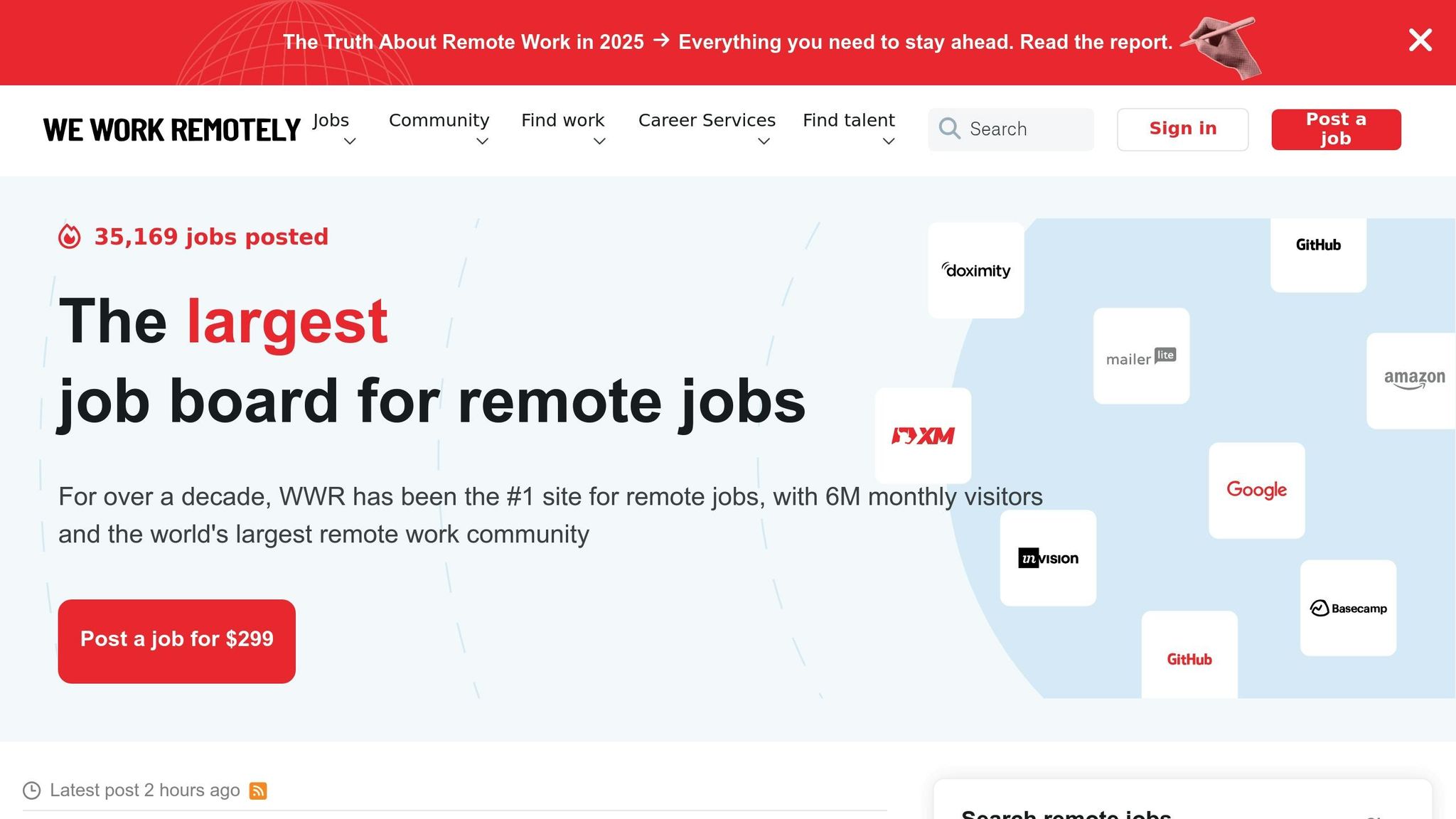
Since 2013, We Work Remotely has posted over 28,000 remote job opportunities across a variety of industries [24]. Among these, the platform stands out as a go-to resource for professionals seeking remote positions in the gaming sector. With a solid track record, it provides a dedicated space for job seekers to connect with gaming companies and studios. Let’s take a closer look at what makes this platform a strong choice for gaming and tech roles.
Specialization in Gaming/Tech Roles
We Work Remotely is home to job postings from gaming companies actively looking for remote talent. For instance, CM Games, an independent game developer with an impressive reach of over 400 million players worldwide, frequently advertises roles on the platform [21]. Similarly, Portal Fantasy, another game development studio, uses the site to recruit remote team members [22].
The platform also highlights unique roles, such as the AI Trainer position at Anuttacon. As of June 20, 2025, the company was hiring for tasks like annotating game content, world-building, and evaluating AI models to enhance their gaming experiences [23].
Types of Job Listings
We Work Remotely caters to a range of work preferences by offering both full-time and contract roles. Job categories include programming, design, customer support, product development, and other specialized fields [20]. This diversity ensures that professionals in the gaming industry can find roles that align with their career goals, whether they’re seeking long-term employment or project-based work.
Filtering Options for Job Search
To make the job hunt smoother, We Work Remotely provides filtering tools that allow users to search by keywords, job category, region, and experience level [24]. The platform also includes a "Curated Jobs" feature, which personalizes recommendations based on user preferences like location, time zones, and job categories. This tailored approach saves time by delivering relevant opportunities directly to the user.
Salary Transparency
One of the standout features of We Work Remotely is its inclusion of salary information for select postings, displayed in USD [20]. While not every listing includes pay details, those that do offer clear insights into potential earnings. For example, a Senior Software Engineer role at Sanctuary Computer in New York City is listed as a contract position with a salary of "$100,000 or more USD" [20].
Other examples include a Senior Product Designer role at Toggl with a salary range of "$50,000 - $74,999 USD" and a Head of Support position at Perspective.co, which offers between "$75,000 - $99,999 USD" [20]. For context, remote engineers in the U.S. earn an average of $96,999 annually, while the average for remote developers across North America is $82,757 [25].
sbb-itb-7cee4ec
7. Remote OK
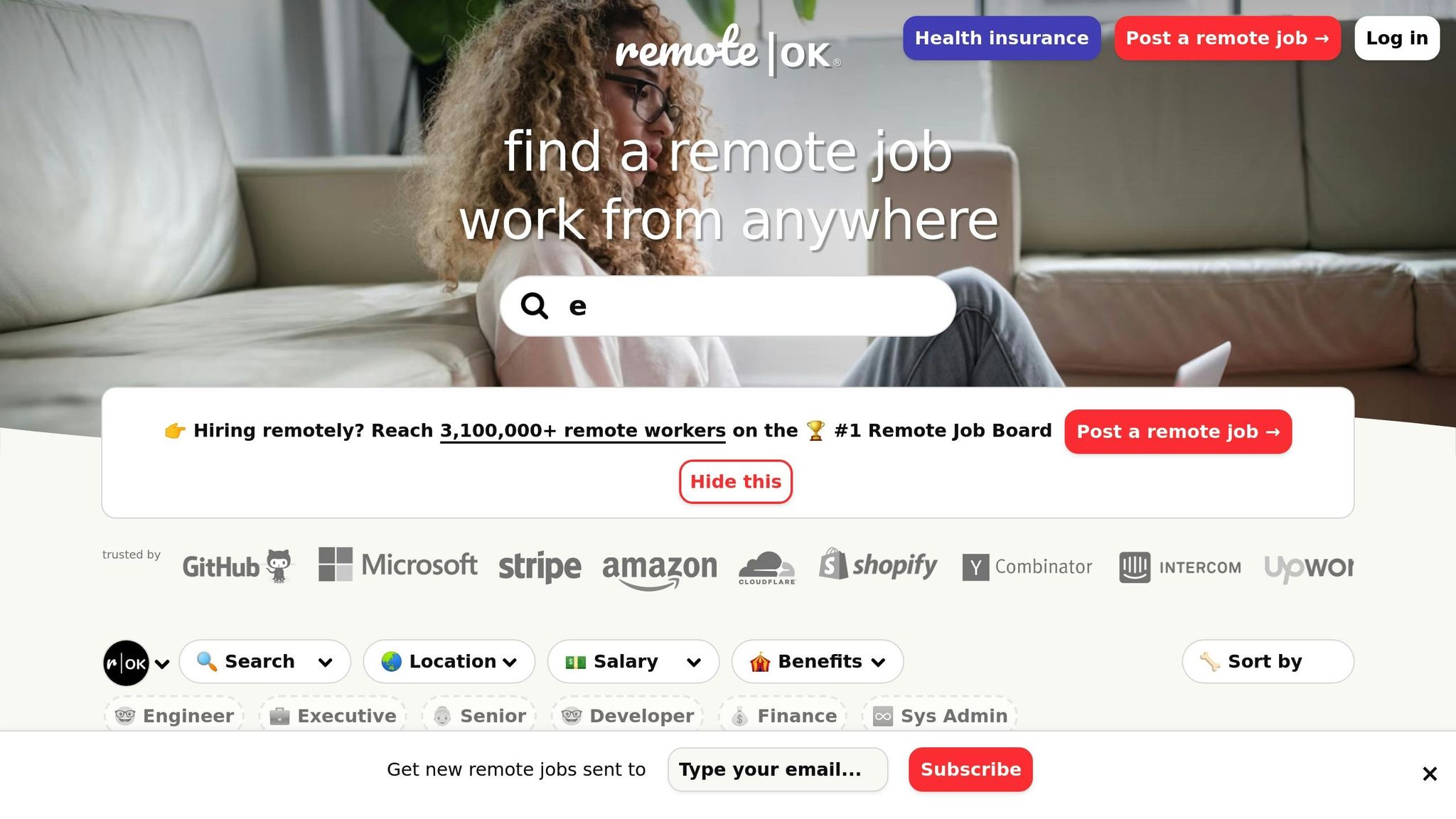
Remote OK stands out as a niche platform offering specialized tools for professionals in the gaming industry. It features dedicated pages like "Remote Game Developer" and "Remote Gaming Jobs", making it easier for game developers to find roles tailored to their expertise. For those with specific technical skills, the platform also provides pages such as "Remote Backend + Game Developer Jobs" and "Remote Front End + Game Developer Jobs", ensuring a more focused job search experience.
Types of Job Listings
Remote OK caters to both full-time employees and contractors, giving professionals flexibility in choosing the type of role that suits their needs. For instance, CSGOEmpire recently advertised a Junior Frontend Developer position requiring Vue.js experience as a contractor role [26]. Similarly, Prixview offered a Senior Full Stack Engineer position with the option to work either full-time or as a contractor [26].
Filtering Options for Job Search
Remote OK simplifies job hunting with advanced filtering tools. One key feature is the ability to set a minimum salary requirement, helping users focus on roles that align with their financial goals. Other filters include benefits like insurance and retirement plans, work arrangements, and geographic preferences.
The geographic filters are particularly helpful, covering regions like Worldwide, North America, Latin America, Europe, Africa, Middle East, Asia, and Oceania. For those looking for even more precision, country-specific filters are available. Additionally, job categories such as "Engineer", "Executive", "Senior," and "Developer" make it easier for gaming professionals to find roles that match their experience and expertise.
Salary Transparency
One of Remote OK's strengths is its commitment to salary transparency. Many listings display compensation clearly in USD, and users can set a minimum annual salary threshold to filter out roles that don’t meet their expectations. This feature ensures candidates can focus on opportunities that align with their financial needs.
8. Remotive
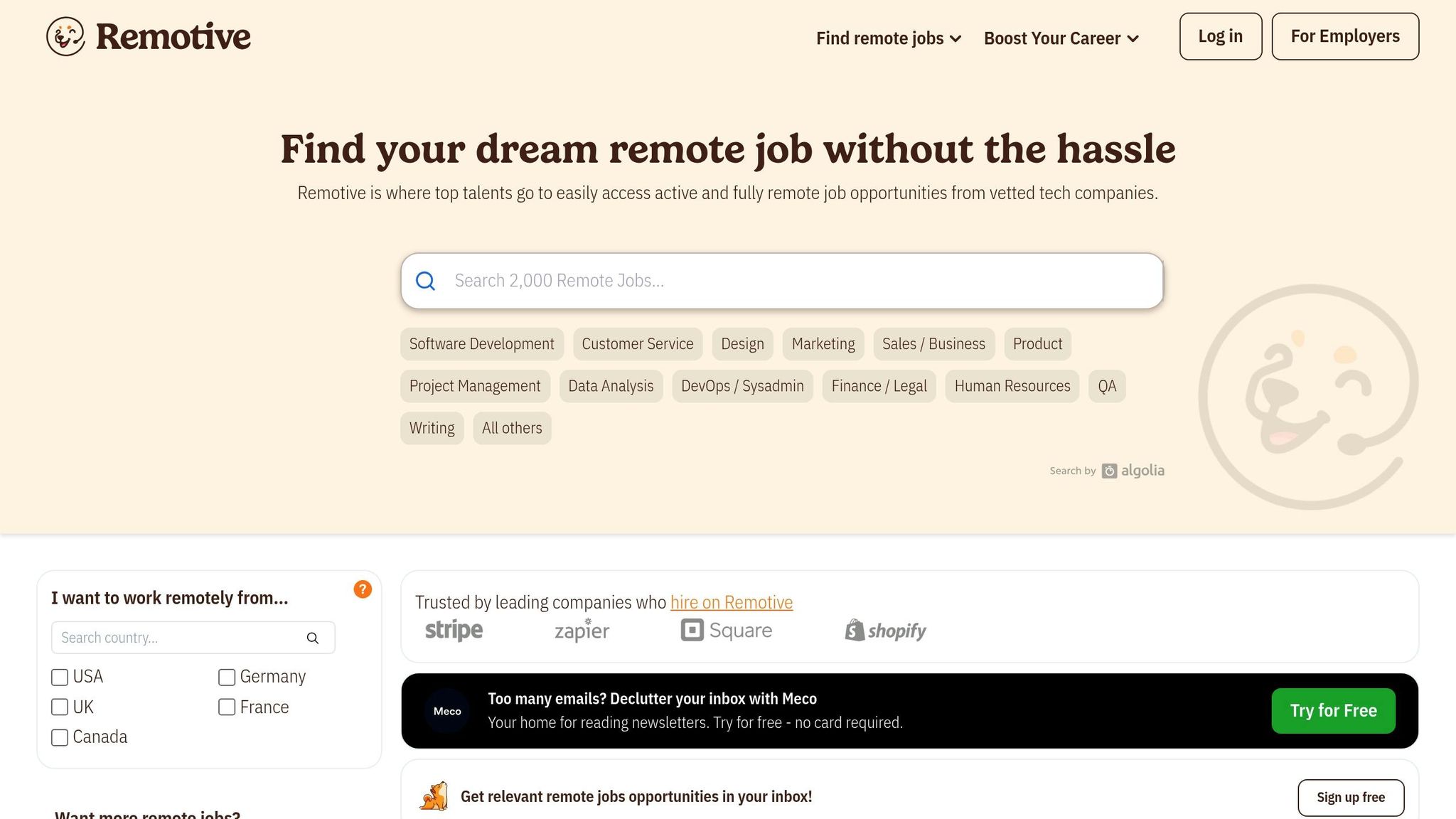
Remotive organizes remote game development jobs into specific categories, making it easier for professionals to find roles tailored to their expertise. For gaming industry roles, the platform has dedicated sections for "games" and "game developer" positions, simplifying the search process and saving time for job seekers [28][29].
Types of Job Listings
Remotive caters to various employment types within the gaming sector, offering full-time, contract, and freelance roles [7]. Here are a few examples:
- Full-time roles: A Senior Game Designer position at Starvania Studio with an annual salary of $27,200.
- Contract roles: Opportunities include an Unreal Developer at Tiny Boat Limited, a 3D Animator at Lunacy Studios, and a Social Media Consultant for Armor Games Studios, which pays $300–$500 per day.
- Freelance gigs: An entry-level Voice Over Actor role at Unfold Games.
The platform also lists specialized positions, like a UI Artist for Half Mermaid Productions, with similar daily compensation rates, and an Online Gameplay Producer role at CI Games.
Filtering Options for Job Search
Remotive’s filtering tools allow users to refine their searches by location, job type, required skills, and company. The platform also offers dedicated pages for game-related roles, ensuring that all listings are carefully reviewed and categorized for relevance and quality [27][28][29].
Salary Transparency
One of Remotive’s strengths is its inclusion of salary information where available. For instance, the Senior Game Designer role at Starvania Studio is listed at $27,200 per year, while the UI Artist position offers $300–$500 per day. However, compensation can vary widely depending on the employer. To provide context, data shows that Remote Game Programmer salaries in the United States average $92,636 annually as of June 2025, with most roles ranging between $24,000 and $145,500 per year [30].
9. LinkedIn
LinkedIn isn't just for general job hunting - it’s a powerful resource for game developers seeking remote opportunities. As the world’s largest professional networking platform, it combines job search tools with networking features, making it a go-to option for those in the gaming industry. With its advanced search capabilities, LinkedIn lets users zero in on remote gaming jobs, helping them navigate the competitive landscape of game development [2]. But it doesn’t stop at job listings; it also fosters connections that can open doors to exciting opportunities.
Focus on Gaming and Tech Roles
One of LinkedIn’s standout features is its ability to connect job seekers directly with recruiters and industry professionals. This is especially valuable in the gaming industry, where networking can be just as important as qualifications. Developers can engage with hiring managers, other game developers, and even industry leaders, building relationships that could lead to future roles. This unique networking aspect gives LinkedIn an edge over other job platforms [2].
Variety of Job Listings
The platform features a wide range of remote positions in game development. Whether you're looking for a full-time position like a Unity Developer at a climate-tech gaming startup, a contract role such as "Game Developer - Swift", or freelance opportunities like Game Narrative Designer, LinkedIn has plenty to offer [31] [32] [33] [34]. These listings cover various specialties, including Game Programmer, Unity Developer, and Game Designer, reflecting the industry’s diverse and ever-changing demands.
Advanced Search and Filtering Tools
LinkedIn’s search tools make finding remote gaming jobs straightforward. You can search for specific roles like "Game Developer" and set "Remote" as the location to focus solely on remote options [35]. The platform also allows filtering by experience level, company, job type, and posting date. For even more precision, Boolean search techniques let users combine keywords and criteria to refine their results [36]. Plus, job alerts can be set up to notify users of new remote openings, ensuring they never miss an opportunity [2].
10. Indeed
Wrapping up our look at top platforms for remote game jobs, we have Indeed - a massive job search site with a broad reach. While it isn’t solely dedicated to gaming, its vast database includes plenty of remote opportunities for game developers. With its simple interface and extensive listings, Indeed caters to professionals at all levels, from beginners to seasoned experts.
Types of Job Listings (Full-time, Contract, Freelance)
Indeed offers a variety of remote game development roles to suit different work preferences. Full-time positions include roles like "Game Designer" at Hitapps and "Game Developer - AI Trainer" at DataAnnotation [37][40]. Contract roles provide flexibility, while freelance opportunities make up a large portion of listings, such as the "Gaming List Writer" position at ComicBook.com, which offers flexible work arrangements [38]. Even part-time roles are available, like the "Unity Developer" position at Theramor, which allows for adaptable scheduling [41].
Filtering Options for Job Search
Indeed’s search filters make it easy to find the right fit for your career goals. You can adjust filters to narrow down listings by salary, setting hourly rates like $40+/hour or annual salaries starting at $80,000+.
Other useful filters include job type, where you can select "Remote" or "Hybrid" roles to focus on location-flexible positions. You can also filter by experience level (Entry, Mid, or Senior) and education requirements (from high school diplomas to advanced degrees). Additionally, the date posted filter ensures you’re seeing the most current listings, with options for jobs posted in the last 24 hours, 3 days, 7 days, or 14 days.
Salary Transparency (Displayed in USD)
Indeed provides clear salary details for remote gaming roles, all displayed in USD. High-level positions often offer six-figure salaries. For instance, the "Senior Game Engine Developer" role at NeuralAI lists a range of $80,000–$150,000 per year [3]. Hourly rates also vary based on the role’s complexity. For example, the "Game Developer - AI Trainer" role starts at $40 per hour, while specialized positions like the "Software Developer" at BAXis offer $50–$70 per hour [3].
Freelance and contract roles often come with unique pay structures. The "Live Game Researcher (MLB)" position at Sportradar, for example, pays $175–$225 per game [42]. Creative roles like the "3D Character Designer in Blender" offer hourly rates ranging from $15 to $40 [39]. This level of transparency helps developers evaluate opportunities that match their skills and financial goals.
Feature Comparison Table
When navigating the remote game development job market, the features offered by different platforms can significantly impact your job search. Knowing what each platform brings to the table helps you make an informed choice. Here's a breakdown of their key strengths and differences.
Some platforms focus solely on gaming roles, like Remote Game Jobs, Work With Indies, and GameJobs, while others, such as Indeed and LinkedIn, cover a much broader range of industries. Specialized boards are often better suited for finding specific gaming-related positions, as they cater exclusively to creative roles like art, design, and programming, whereas general platforms require additional effort to filter out non-gaming jobs [43].
Filters and search tools are another critical factor. Most platforms allow filtering by employment type, location, salary, and posting date. However, the best platforms go further, enabling searches by experience level or specific gaming skills, which can save you valuable time.
Salary transparency also varies. General platforms like Indeed often display clear salary ranges in USD, while many gaming-specific boards require you to contact employers directly to discuss compensation.
Here’s a side-by-side comparison of the major platforms:
| Platform | Game Focus | Job Types | Advanced Filters | Salary Display | Pricing for Employers |
|---|---|---|---|---|---|
| Remote Jobs For Software Engineers | Partial | Full-time, Contract, Freelance | Yes | Yes | $19–49/month |
| Remote Game Jobs | Yes | By category/skill | Yes | No | $29 per listing |
| Work With Indies | Yes | By department | Yes | No | $49–199 per listing |
| GameJobs | Yes | By function/location | Yes | No | $299–405 per listing |
| WellFound | No | Startup-focused | Yes | Yes | Varies |
| We Work Remotely | No | By category | Basic | No | Varies |
| Remote OK | No | Multiple types | Yes | Yes | Varies |
| Remotive | No | By skills/location | Yes | No | Varies |
| No | All types | Yes | Yes | Varies | |
| Indeed | No | All types | Yes | Yes | Varies |
User experience is another area where platforms differ. Large sites like LinkedIn and Indeed offer robust filtering and networking tools, making them versatile for job seekers. On the other hand, niche boards such as Remote Game Jobs and Work With Indies provide interfaces specifically designed for gaming roles, which can make the search process more streamlined. Interestingly, remote game boards reportedly attract 2.5× more candidates than general platforms [44], which can increase competition for top roles.
Pricing also reflects the differences in focus. For instance, Work With Indies charges $49 to $199 per listing [43], possibly indicating a higher-quality pool of opportunities compared to platforms with variable pricing models.
Understanding these distinctions can make your job search more efficient and help you zero in on the perfect remote gaming role.
Conclusion
Landing a remote game development job takes more than just browsing job listings - it requires a thoughtful approach and strategic use of available resources. Each platform has its own strengths, whether it’s niche boards or broader job sites, and understanding how they work can make all the difference in your job search.
Specialized platforms like Remote Game Jobs, Work With Indies, and GameJobs are great for finding opportunities within tightly-knit gaming communities. On the other hand, general platforms such as LinkedIn and Indeed offer a wider reach and excellent networking possibilities. As Muhammad Salal, Senior Game Developer at OSA Studios, points out:
"Remote work has now become a staple in game development, and as such there are many opportunities available remotely. And remember having good connections is just as important as having good development skills" [45].
To stand out, you need more than just a polished resume. A tailored application, an impressive portfolio, and a clear demonstration of your skills are essential. For instance, one developer successfully highlighted their Unreal Engine expertise, showcasing skills like Blueprint usage, native C++ programming, Visual Studio debugging, and project packaging - all of which helped them secure a position.
Don’t underestimate the value of soft skills, either. Daniel Kramer, Senior Quest Designer at Ubisoft Bordeaux, stresses their importance:
"Soft skills are very important as a dev as you will be working with a lot of different departments and nationalities depending on where you end up. Hard skills will land you the interview up to a point where the soft skills and how you can integrate into a team becomes important. No one wants to work alongside someone they can't have a day to day conversation with" [45].
Using strategies like the "Studio Checklist Method" - where you treat job postings as a guide to tailor your resume and cover letter - can give your application a competitive edge [1]. By combining the right platforms, a strong portfolio, and meaningful networking, you can position yourself for success in the remote game development world.
FAQs
::: faq
How do salary transparency and advanced filters improve the job search on remote game job boards?
Salary transparency on remote game job boards plays a key role in building trust. By clearly outlining compensation details upfront, it helps job seekers quickly assess whether a position aligns with their financial expectations and career goals. This clarity also gives candidates the confidence to approach negotiations better prepared.
Advanced search filters take efficiency to the next level. These tools let users refine their search based on factors like location, experience level, or job type. The result? Less time spent scrolling and more focus on roles that match their skills and preferences.
When combined, these features make the job search process smoother and more tailored, turning remote game job boards into powerful tools for candidates seeking their next opportunity. :::
::: faq
What are the benefits of using specialized gaming job boards to find remote game development jobs?
Specialized gaming job boards are a go-to resource for anyone aiming to break into or advance within the game development industry. These platforms streamline your search by showcasing roles exclusively tied to gaming, sparing you the hassle of wading through unrelated job postings you'd encounter on broader job sites.
What makes these boards even more valuable is their community. They attract employers and professionals who are deeply invested in gaming, fostering a concentrated network where you can connect, learn, and collaborate. This focused environment often leads to better opportunities that align closely with your skills and career aspirations in game development. :::
::: faq
What can game developers do to stand out when applying for remote jobs?
To make a mark in the competitive remote job market, game developers should focus on tailoring their applications to highlight key skills and relevant experience. Start by customizing your resume for each position, showcasing your proficiency with specific tools, technologies, and game engines. Equally important is a strong portfolio - let your work speak for itself by visually demonstrating your talents rather than merely describing them.
It’s also crucial to spotlight any remote work experience you have and your ability to communicate effectively. Employers look for candidates who excel at time management and can collaborate efficiently in a remote environment. By emphasizing these qualities, you can make your application stand out and increase your chances of landing the job. :::
